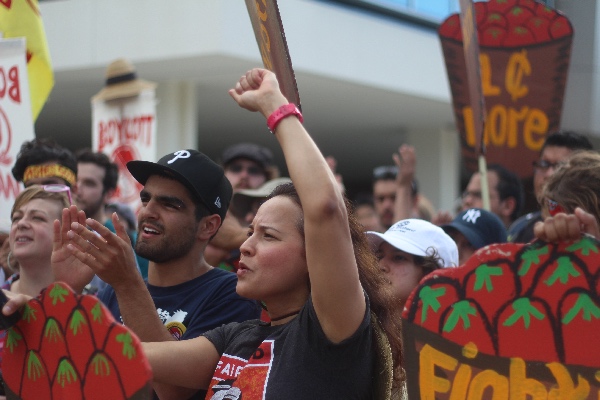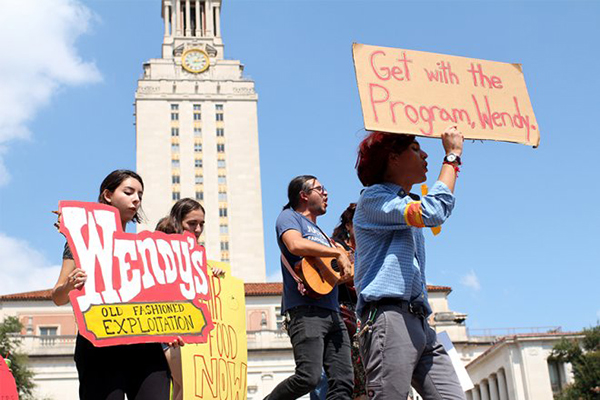
“I will not be spending any money or allowing friends or colleagues to spend money on a company that is benefiting from the exploitation of farmworkers…”
After Florida farmworkers and their Southwest Florida allies took to the streets of Naples last week with a lively protest to kick off the Wendy’s Month of Outrage, students across the country have been taking to the pages of their school papers to send a powerful message of their own to Wendy’s this month. In addition to the excellent op/ed we already shared from a Kenyon College student, two more student-authored articles came out just last week, giving voice to young people’s growing frustration with Wendy’s and the fast-food giant’s decision to turn its back on the best human rights program in agriculture today.
Extensive and well-researched, both articles document students’ unwavering support for Fair Food, and their rapidly evaporating patience with Wendy’s, in no uncertain terms.
First up, right here in the Fair Food Nation’s home state of Florida, New College student Kat Grimmett drew on her direct experience of marching through the streets of Palm Beach during last month’s historic Workers’ Voice Tour, and on her interviews with farmworkers and fellow students alike, to call out Wendy’s for its refusal to join the Fair Food Program. Here a few of the highlights from Ms. Grimmett’s excellent article, which was published in New College’s student-run paper, Tangent, last week:
“Your burgers may be square but your food ain’t fair:” Hundreds of students, farmworkers and consumers take to the streets in a national boycott of Wendy’s
Kat Grimmett, April 5, 2016
“Wendy’s— escucha! estamos en la lucha!” “El pueblo, unido, jamas sera vencido!” “Que queremos? Justicia! Cuando? Ahora!” (“Wendy’s— listen! We are in the fight!” “The people, united, will never be divided.” “What do we want? Justice! When do we want it? Now!”)
These are just a few of the dozens of chants that rang through the streets of West Palm Beach on Saturday, March 12. They came from the mouths of individuals and organizations, of students and farmworkers, of people united with the Coalition of Immokalee Workers (CIW) in protest and national boycott of Wendy’s. […]
[…] Hundreds of marchers trekked down the glossy streets of downtown West Palm with an irresistible energy. Spectators in cars, shops and on the sidewalks flipped out their phones to record the mass of activists fighting for a boycott of Wendy’s and, by extension, rights for farmworkers.
“Many people saw for the first time the faces of the people responsible for the fruits and veggies on their table,” Lucas Benitez of the CIW said to the hundreds of marchers gathered in front of where he stood in a flat-bed truck adorned with “Boycott Wendy’s” signs and flags. “Their reality is tied to our reality and they can’t continue to ignore us.”
Since the FFP launched in 2010, 14 major food corporations from McDonalds to Walmart have signed onto the program and validated the need for improved working conditions and dependable wages for farmworkers.
Instead of following in the footsteps of virtually all their competitors, Wendy’s opted to move in the opposite direction and switched its purchases from Florida to Mexico in the early days of the FFP.
Wendy’s new source was uncovered just last month in a Harper’s Magazine article. Bioparques de Occidente, a farm which was the subject of a major slavery prosecution in 2013 and which still provides 6 million cases of tomatoes to the U.S. market every year, now sells to Wendy’s. In case you’re wondering, these tomatoes are sold under the brand name Kaliroy (read the sticker).
“My relationship with Wendy’s, personally and professionally, is none,” Nico Gumbs, the youth program coordinator for the National Farmworker Ministry, declared at the march. “I will not be spending any money or allowing friends or colleagues to spend money on a company that is benefiting from the exploitation of farmworkers.” […]
[…] At the march in West Palm, I had the privilege to speak with Wilson Perez, a Florida farmworker and seven-year member of the CIW. The Coalition graciously provided a volunteer to translate my questions and his story.
“I had a problem in the fields once and I couldn’t find anywhere to solve it and bring my grievance forth,” Perez said. “Three weeks went by where the problem went unresolved and by then it was too late but the great thing was that I found the CIW and to know that for the future the Coalition of Immokalee Workers could help me in these cases.
“With the Fair Food Program, there have been deep transformations in the fields of Florida,” Perez added. “We’ve had a series of new rights that we’ve won and been able to implement. I saw the changes happen because, when I began work, there was a different reality…” read more
Just a day after Ms. Grimmett’s article was published in Florida, over a thousand miles away in Texas, University of Texas student Nashwa Bawab posted an extensive piece in The Daily Texan, detailing the impressive history of the Student / Farmworker Alliance at UT, all the way from the original Taco Bell boycott in the early 2000’s to the national Wendy’s Boycott, launched just last month.
Along with the national boycott, students across the U.S. have been waging the “Boot the Braids” campaign over the last two years, working tirelessly to pressure University administration officials to cut their institutions’ contractual relationships with Wendy’s over the fast food giant’s disregard for human rights — and students at the University of Texas in Austin (which has a Wendy’s right at the heart of campus) are leading the way.
Here are just a few highlights from Ms. Bawab’s piece in The Daily Texan (though make sure to read the full piece!):
“Boot the Braids” protest emulates similar “Boot the Bell” protest from years ago
Nashwa Bawab, April 6, 2016
In 2003, UT students of several organizations joined the “Boot the Bell” campaign by donning tomato suits and chanting in hopes of boycotting Taco Bell for not treating farmworkers humanely. Last fall, this call to action was revived when the UT chapter of the Student-Farmworker Alliance (SFA) marched across the West Mall to “Boot the Braids,” a campaign to boycott Wendy’s.
The cause driving some students to protest the two Wendy’s franchises on campus currently is similar to the cause that was able to mobilize students so many years ago: Wendy’s has not signed onto the Fair Food Program, a partnership among farmworkers and food companies that helps guarantee fair wages as well as other humane working conditions for those who work in the fields.
Wendy’s is now the last of the five major food chains in the U.S. to not sign onto the Fair Food Program, and last fall, UT’s SFA had a protest, hosted a movie screening and sent an open letter to President Gregory Fenves encouraging UT to break their contract with the Wendy’s in Jester and in the Texas Union.
UT has not stated whether they will end their contract with Wendy’s, but given UT’s size and prominence in the state, SFA believes losing UT’s business could be a wake-up call for Wendy’s. Students in the campaign hope Wendy’s will be pressured into signing a deal with the Coalition of Immokalee Workers (CIW) — an organization known for its work in fighting for the humane treatment of farmworkers — if their consumers, such as UT, send a clear message. […]
[…] Wendy’s spokesperson Bob Bertini said Wendy’s, like many companies, does not purchase directly from the people who harvest the produce they use in their food. Wendy’s gets their produce from distributors who employ farmers. Therefore, Bertini said he does not think the company should be responsible for the extra fee they would be required to pay if they made a deal with the CIW.
“What the coalition wants us to do is pay an added fee to the harvesters on top of the contracted price we pay our suppliers,” Bertini said. “They want us to do that even though these workers are not Wendy’s employees. They are hired by our suppliers.”
Bertini said Wendy’s only works with suppliers and companies that share their commitment to quality, integrity and ethics and even created a code of conduct for their suppliers in 2015 to prove that.
The Wendy’s code of conduct lists expectations for distributors in regards to worker treatment, hiring practices, wages and benefits, child labor and workplace discrimination. According to their code of conduct, their distributors are expected to comply with the Fair Labor Standards Act, which is a federal act that serves as a guideline for fair labor treatment.
CIW member Santiago Perez said the Wendy’s code of conduct isn’t enough and does not respond to what the group is asking of all food corporations. He spoke to the Daily Texan in Spanish, and his interview was interpreted by Natali Rodriguez of SFA.
“What we want is for Wendy’s to be responsible for the purchases that they make,” Perez said. “That doesn’t only mean that we ask them to pay the extra penny per pound of tomatoes, but it also means that we ask them to respect workers rights, which is more crucial.” […]
[…] Soncia Reagins-Lilly, dean of students and senior associate vice president for student affairs, has oversight responsibility of the Texas Union and spoke to the Texan on behalf of the director of University Unions. She said all matters of civil liberty of workers rights is important to the University and something they hope to fix through a culture change.
“The future is unknown,” Reagins-Lilly said. “We don’t know what will become our relationship with many of our contracts and our vendors, but what we do know is that when matters are brought to our attention, we investigate them, we look into them. What you can look forward to is an active effort to understand the allegations.” […]
Active effort is something that could tip the scale in favor of the SFA and CIW, according to [Natali Rodriguez, national staff of the Student / Farmworker Alliance], who said an institution as big as UT holds a lot of cards in debates such as this one, and the Taco Bell campaign was proof of that.
“If we look at what happened with the Taco Bell campaign in the past as an example, it is very clear that student pressure could lead to these corporations into making the right decisions,” Rodriguez said. “You’re talking about their own consumers telling them what to do.”
The efforts by the 200 schools involved with the “Boot the Bell” campaign and the 25 schools that were able to end current or pending contracts were the tipping point for Taco Bell and reason they were the first to sign a deal with the CIW, Rodriguez said. Rodriguez said she believes the best and only way to make a company as big as Wendy’s sign their deal is to have a large backing by consumers.
The purpose of the protest and letters against Wendy’s by the SFA last semester was to gain support from the consumers we see every day: the students, faculty and administration of UT.
Check back soon for more reports from the April Month of Outrage in the national Wendy’s boycott — and make sure to send us your own updates, too!




